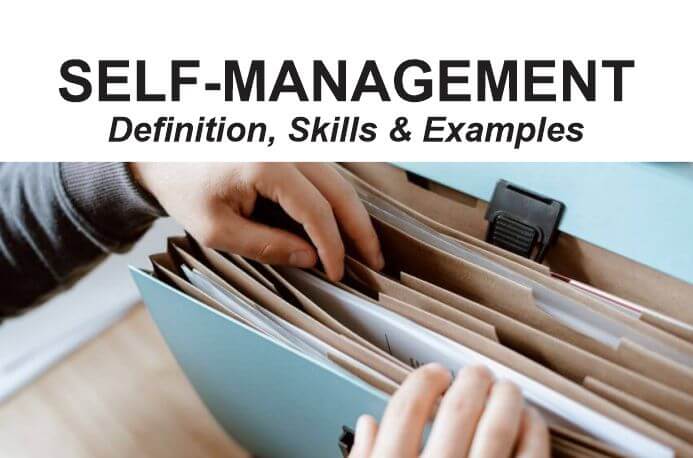Last updated on December 21st, 2023 at 07:26 pm
What is self management? The ability to regulate and direct your actions, emotions, and thoughts towards achieving personal and professional goals.
It is an important life skill that you must keep handy to achieve success in your personal and public life.
When you manage yourself effectively, you set priorities and achievable milestones, and take decisions and responsibility for your actions.
Having a strong grip on your emotions and behaviour will lead to more productivity, better stress-handling, and better overall well-being.
In this article, we will explore what self management is, its importance, and how it can positively impact various aspects of life.
Related: Essential Self Management Skills for Success
Table of Contents
- What is Self Management?
- Why Self Management is Important
- What are the Seven Steps of Self Management?
- Importance of Self-management in Personal and Professional Life?
- Self Management Emotional Intelligence
- Key Aspects of Self-management
- How to Improve Self Management
- Developing Self Management
- Self Management Strategies for Students
- Final Thoughts
- Frequently Asked Questions
What is Self Management?
Self Management Definition
Self management can be viewed as a set of strategies and techniques that individuals employ to effectively navigate the demands of daily life.
It involves taking responsibility for your actions, behaviours, and outcomes, and actively seeking opportunities for growth and development.
Managing yourself requires a high level of self-awareness, as you must understand your strengths and weaknesses, and make conscious choices that align with your personal and professional goals.
Self-management is not about perfection or achieving optimal productivity at all times; rather, it is about finding a balance that allows for personal well-being while still achieving desired outcomes.
Recommended: What is Multitasking? Pros and Cons
Why Self Management is Important
Effective self-administration is particularly important in today’s technology-driven world.
With constant distractions and demands competing for your attention, it is easy to become overwhelmed and lose sight of your goals.
However, by practicing self-dscipline, you can regain control over your time and energy, and focus on what truly matters to them.
This is especially crucial in the workplace, where deadlines, meetings, and tasks can easily consume all available resources if not managed properly.
Self-dscipline helps you prioritize tasks, set realistic goals, and maintain a healthy work-life balance.
Related: Understanding Social Intelligence: A Guide to Navigating Social Situations
What are the Seven Steps of Self Management?

Self management refers to the ability to regulate your thoughts, emotions, and behaviours to achieve personal goals.
It involves several components that work together to promote self-discipline, self-control, and personal effectiveness.
The components of self-discipline include:
1. Self-awareness: This involves being conscious of your thoughts, emotions, strengths, weaknesses, and values. Self-awareness involves recognizing and acknowledging one’s triggers, behaviors, and patterns, which helps in making conscious choices and decisions.
2. Emotional Regulation: This is the ability to identify, understand, and manage your emotions effectively. It involves recognizing and accepting emotions, regulating emotional responses, and appropriately expressing emotions.
3. Time Management: Time management involves planning and organizing your time effectively to prioritize tasks, set goals, and meet deadlines. It involves utilizing time-efficient strategies and techniques to optimize productivity and achieve personal objectives.
4. Goal Setting: Goal setting involves identifying specific, measurable, achievable, relevant, and time-bound (SMART) goals. It helps in providing direction, motivation, and focus to personal efforts and actions.
5. Self-Discipline: Self-discipline is the ability to control your impulses, emotions, and behaviours to persevere and achieve desired outcomes. It involves setting boundaries, managing distractions, and maintaining a consistent effort towards personal goals.
6. Stress Management: Stress management involves adopting healthy coping mechanisms and strategies to deal with stress and pressure effectively. It includes activities such as relaxation techniques, exercise, meditation, and seeking social support.
7. Adaptability: Adaptability is the ability to adjust and respond effectively to changes, challenges, and setbacks. It involves being flexible, open-minded, and resilient in the face of obstacles or unexpected circumstances.
Watch this short video on self-management by Minds-on ATL
Importance of Self-management in Personal and Professional Life?
Self-management is an important skill that can benefit individuals in both their personal and professional lives.
Here are some of the key reasons why self-management is important:
- Improved productivity and efficiency: When individuals practice self-management, they are better able to manage their time and prioritize tasks, leading to increased productivity and efficiency.
- Better time management: Self-management helps individuals make the most of their time by setting clear goals and deadlines, avoiding distractions, and staying focused on their priorities.
- Reduced stress and anxiety: When individuals have a clear plan and can manage their time effectively, they are less likely to feel overwhelmed or stressed. This can lead to better overall well-being and reduced anxiety.
- Increased self-esteem and confidence: Self-management requires individuals to take control of their own lives and make decisions that align with their goals and values. This can lead to increased self-esteem and confidence as individuals feel empowered and in control of their own lives.
- Better decision-making: When individuals practice self management, they are better able to make informed and effective decisions that align with their goals and priorities.
Related: What is Irritability? Signs and Causes
Self Management Emotional Intelligence
Self-awareness, self-dscipline, and social awareness are the complete components of emotional and social intelligence that sets you up for success in society.
Self management is a critical component of emotional intelligence because it involves the ability to regulate your emotions and behaviours, adapt to changing situations, and remain focused on long-term goals.
People with strong self-management skills are often better able to manage stress, avoid impulsive decisions, and maintain their composure in challenging situations, all of which are important aspects of emotional intelligence.
Related: Applying Self Management for Healthy Living
Key Aspects of Self-management

Time Management
One key aspect of managing the self is time management. Effective time management involves identifying priorities, setting goals, and planning and organizing tasks in a way that maximizes productivity.
This includes strategies such as creating to-do lists, breaking down tasks into smaller, manageable steps, and allocating specific time slots for different activities.
Time management also involves being aware of your energy levels and working patterns, and scheduling tasks accordingly.
For example, some individuals may be more productive in the mornings, while others may prefer to tackle complex tasks in the afternoon.
By understanding your preferences and patterns, you can optimize your productivity and avoid wasting time on less important tasks.
Emotional Intelligence
Another important aspect of self management is emotional intelligence.
Emotional intelligence is the ability to recognize, understand, and manage your emotions, as well as to empathize and connect with others.
It plays a crucial role in managing yourself, as you must be aware of your emotional states and how they can impact your decision-making and behaviours.
For example, stress, anxiety, or anger can cloud judgment and lead to impulsive or irrational actions.
By developing emotional intelligence, you can become more self-aware, regulate your emotions, and make informed decisions that align with your goals.
How to Improve Self Management

The following tips would help to improve self-management and act like a leash of restraint:
- Set clear goals and priorities: Define your goals and prioritize them based on their importance and urgency. This will help you to focus your time and energy on the things that matter most.
- Develop a routine or schedule: Create a routine or schedule that includes regular work and rest periods. Stick to this routine as much as possible, as it will help you to establish good habits and manage your time effectively.
- Avoid distractions: Identify the things that distract you the most and find ways to minimize them. This might mean turning off your phone during work hours or using noise-cancelling headphones to block out noise.
- Learn to say “no”: It’s important to recognize when you are taking on too much and to say “no” to requests or commitments that do not align with your priorities or goals.
- Practice self-care: Take care of your physical and mental health by getting enough sleep, eating well, exercising regularly, and taking breaks when needed.
- Embrace self-discipline: Discipline yourself to follow through on your commitments and to stick to your schedule, even when it’s difficult or uncomfortable.
Developing Self Management
Developing self management skills requires practice and commitment.
It starts with self-reflection and understanding your values, strengths, and areas for improvement.
You should take the time to assess your current habits and behaviours, and identify any patterns that may be hindering your self-management efforts.
This may include procrastination, a lack of prioritization, or difficulty saying no to additional tasks or commitments.
Once these underlying issues are identified, you can begin implementing strategies and techniques to improve your self-administration.
Self Management Techniques
One useful technique for managing self is setting SMART goals.
SMART stands for specific, measurable, achievable, relevant, and time-bound.
By setting goals that meet these criteria, you can have a clear focus and direction and can track your progress over time.
This helps to maintain motivation and ensures that efforts are aligned with desired outcomes.
Additionally, you can benefit from using tools and technology that assist with self-governance, such as digital calendars, task management apps, and project management software.
These tools can help individuals stay organized, track progress, and manage their time effectively.
Self-care
Another important aspect of self-management is self-care.
Self-care refers to activities and practices that promote physical, mental, and emotional well-being.
It involves taking care of your health, engaging in activities that bring joy and relaxation, and setting boundaries to protect your energy and time.
Self-care is crucial for maintaining resilience and preventing burnout, which can hinder self-management efforts.
By prioritizing self-care and ensuring that personal needs are met, you can better manage your time and energy, and maintain a healthy work-life balance.
Self Management Examples
Here are some examples of scenarios that can demonstrate self management:
- A student has a busy schedule with classes, extracurricular activities, and part-time work. They prioritize tasks, create a schedule, and use techniques like setting deadlines and minimizing distractions to manage their time effectively.
- An employee faces a challenging situation at work, but instead of reacting impulsively or becoming overwhelmed, they take a moment to calm themselves, think rationally, and choose an appropriate response. They manage their emotions to maintain a productive and positive work environment.
- A professional sets both short-term and long-term career goals. They break down these goals into smaller, manageable tasks and create a plan to achieve them. They regularly review their progress, adjust their course if needed, and celebrate achievements along the way.
- A person experiences high levels of stress in their personal life, but instead of letting it affect their well-being, they practice stress management techniques such as exercise, meditation, or engaging in hobbies to relax and rejuvenate.
- An entrepreneur starts a small business with limited funds. They carefully allocate resources, such as finances, time, and personnel, to ensure that they are utilized effectively and efficiently to optimize the business’s growth and success.
- A salesperson sets ambitious targets for themselves and constantly motivate themselves to achieve those targets. They persistently seek opportunities for improvement, attend training, and surround themselves with like-minded individuals who can inspire and motivate them to reach their goals.
Self Management Strategies for Students

Self management strategies for students are the skills and techniques that students can use to effectively manage their time, behaviour, and emotions to achieve academic success.
These strategies enable students to take control of their learning and become responsible for their actions and progress.
Here are some common self-management strategies for students:
1. Goal Setting: Students can set short-term and long-term goals for their academic performance and create a plan to achieve them. This helps them stay focused and motivated.
2. Time Management: Students can learn to prioritize tasks, create schedules, and allocate time for studying, completing assignments, and other activities. This helps them avoid procrastination and meet deadlines.
3. Organization: Students can develop systems to keep track of their assignments, materials, and resources. This may include using a planner, creating folders for different subjects, or utilizing digital tools for organization.
4. Study skills: Students can learn effective study techniques such as note-taking, summarizing information, active reading, and practicing self-testing. These skills enhance comprehension and retention of information, leading to better academic performance.
5. Self-reflection: Students can regularly reflect on their strengths and weaknesses, learning progress, and areas of improvement. This allows them to identify strategies that work best for them and make necessary adjustments.
6. Self-regulation: Students can practice self-control and discipline to manage their behavior, impulses, and distractions. This includes staying focused during study sessions, avoiding distractions like social media, and practicing self-discipline to complete tasks.
7. Stress management: Students can develop strategies to cope with academic and personal stress. This may include taking breaks, engaging in physical activity, practicing relaxation techniques, seeking support from others, or using stress management apps.
8. Self-advocacy: Students can learn to communicate their needs, seek help, and take responsibility for their learning. This involves speaking up in class, asking questions, seeking clarification, and seeking assistance when needed.
Final Thoughts
Self management is a crucial skill for success and fulfillment in both personal and professional life.
It involves effectively managing time, energy, and resources to achieve goals, and requires self-awareness, emotional intelligence, and proactive decision-making.
By developing self-management skills, individuals can regain control over their lives, prioritize tasks, and maintain a healthy work-life balance.
Self-management is not about perfection or achieving optimal productivity at all times; rather, it is about finding a balance that allows for personal well-being while still achieving desired outcomes.
By practicing self-reflection, setting SMART goals, and prioritizing self-care, individuals can improve their self-management skills and create a more fulfilling and successful life.
Frequently Asked Questions
Here are some frequently asked questions about self-management:
What is self-management?
Self-management is the ability to take responsibility for your actions and to regulate your behavior to achieve your goals and objectives. It involves setting priorities, making plans, managing your time effectively, and staying focused on your goals.
Why is self-management important?
Self-management is important because it allows individuals to take control of their lives and to make informed decisions that align with their goals and values. It helps to reduce stress and anxiety, increase productivity and efficiency, and improve overall well-being.
What are some self-management skills?
Some self-management skills include goal setting, time management, organization, prioritization, decision-making, self-discipline, and self-reflection.
How can I improve my self-management skills?
You can improve your self-management skills by setting clear goals and priorities, developing a routine or schedule, avoiding distractions, learning to say “no”, practicing self-care, and embracing self-discipline.
What are the consequences of poor self-management?
Poor self-management can lead to increased stress and anxiety, decreased productivity and efficiency, missed deadlines, and a general sense of feeling overwhelmed and out of control.
Can self-management skills be learned?
Yes, self-management skills can be learned and developed with practice and persistence. By implementing self-management strategies and being intentional about your actions, you can improve your self-management skills and become more effective at achieving your goals and reducing stress and anxiety.
REFERENCE:
- What Is Self-Management, and How Can You Improve It?
- https://asana.com/resources/self-management
- https://www.betterup.com/blog/what-is-self-management-and-how-can-you-improve-it
- https://transformingeducation.org/resources/introduction-to-self-management/
- https://www.babbelforbusiness.com/us/blog/self-management/
Pious Clements is the insightful voice behind "The Conducts of Life" blog, where he writes about life ethics, self-development, life mastery, and the dynamics of people and society.
With a profound understanding of human behaviuor and societal dynamics, Pious offers thought-provoking perspectives on ethical living and personal growth.
Through engaging narratives and astute observations, he inspires readers to navigate life's complexities with wisdom and integrity, encouraging a deeper understanding of the human experience and our place within society.
